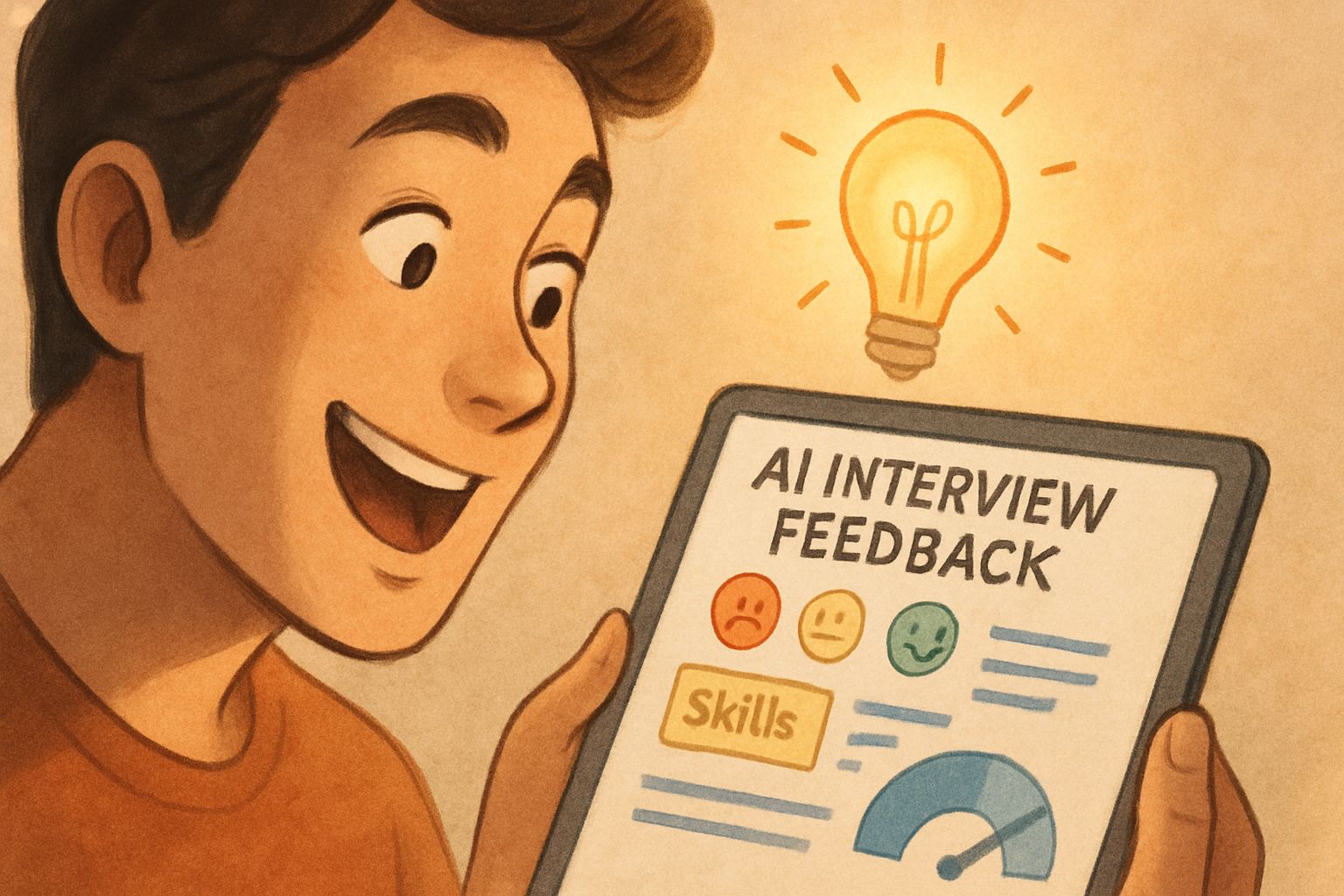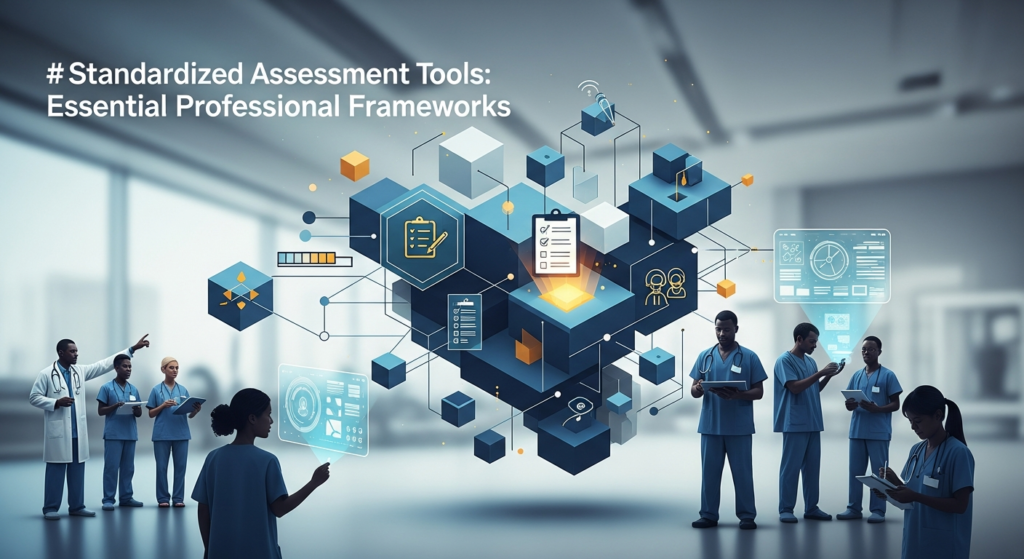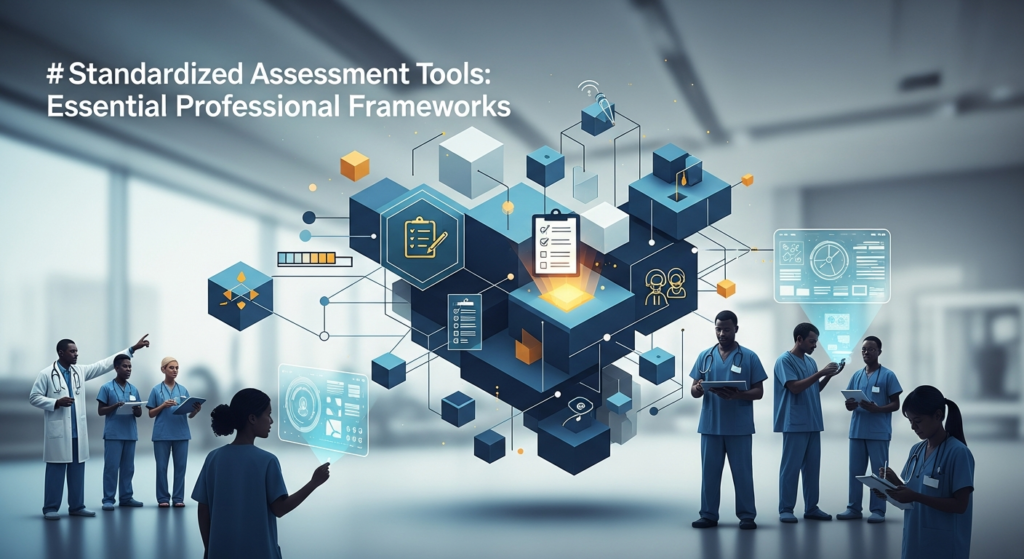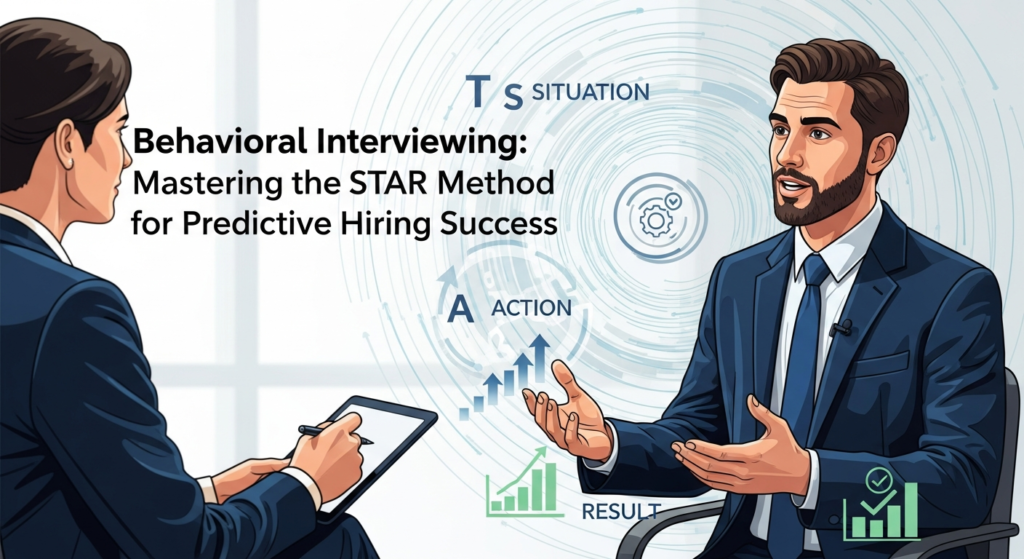The job interview landscape is evolving at breakneck speed, and Artificial Intelligence (AI) is at the forefront of this transformation. Gone are the days when your only practice options were a nervous monologue in front of the mirror or roping in a reluctant friend. Today, AI interview practice platforms offer sophisticated tools to hone your skills, providing instant, data-driven insights. But here’s the crucial part: receiving AI feedback is only half the battle. Knowing how to effectively interpret, internalize, and act upon this feedback is what truly separates a prepared candidate from an outstanding one. If you’re ready to supercharge your interview preparation, let’s dive into how you can make AI feedback work powerfully for you.
Why AI Feedback is a Game-Changer for Interview Practice
Before we explore the “how,” let’s appreciate the “why.” AI interview practice tools, like those offered by AceJobi, are revolutionizing preparation by offering several distinct advantages over traditional methods. Understanding these benefits will help you leverage the AI feedback more effectively.
- Accessibility and Convenience: Practice anytime, anywhere. No need to coordinate schedules or find a quiet space outside your home. This flexibility means you can fit in more practice sessions, especially when you’re targeting multiple roles.
- Objectivity (with a Caveat): AI algorithms are designed to analyze your responses based on predefined criteria, reducing the human biases that can sometimes creep into feedback from friends or family. While AI isn’t entirely free of its own programmed biases, it offers a more consistent and standardized evaluation of certain performance aspects. Good AI interview practice platforms strive for neutrality in their core feedback mechanisms.
- Instantaneous Insights: The wait for feedback is over. AI-powered platforms can provide an analysis of your performance almost immediately after you complete a mock interview. This rapid turnaround allows for quick iteration and improvement. You can identify areas for development and re-practice right away, making your learning cycle much faster.
- Detailed Metrics and Analytics: AI can track a wide array of metrics that humans might miss – think filler word count, speaking pace, eye contact (on video), sentiment analysis, and even the relevance of your answers to specific questions using techniques like the STAR method. This detailed AI feedback provides a granular view of your performance.
- Personalized Learning Paths (Potentially): Advanced AI systems can adapt to your specific needs, focusing on areas where you struggle most. As you practice with AI, the system can learn your patterns and suggest targeted exercises or questions to help you improve.
Understanding the Different Facets of AI Feedback
AI feedback isn’t monolithic. It typically covers several dimensions of your interview performance. To make the most of it, you need to understand what each type of feedback means:
- Content-Based Feedback: This looks at what you said.
- Keyword Relevance: Did your answer include keywords relevant to the question or the job description?
- STAR Method Adherence: For behavioral questions, did you structure your answer using Situation, Task, Action, and Result? Some AI tools are sophisticated enough to detect this structure.
- Clarity and Conciseness: Was your answer easy to understand, or did you ramble? AI can sometimes flag overly long or convoluted responses.
- Sentiment Analysis: What was the overall tone of your answer? Positive, negative, neutral? This can be crucial for questions about teamwork or handling challenges.
- Delivery-Based Feedback: This focuses on how you said it.
- Pacing: Were you speaking too fast or too slow? AI can measure your words per minute and compare it to optimal ranges.
- Filler Words: How often did you use “um,” “uh,” “like,” “you know”? Excessive filler words can undermine your credibility. AI feedback tools are excellent at catching these.
- Pauses: Did you use pauses effectively, or were there awkward silences or rushed speech?
- Vocal Variety (Tonality): Was your voice engaging, or monotonous? Some advanced AI can assess pitch variation.
- Non-Verbal Communication Feedback (for Video Practice):
- Eye Contact: Were you looking at the camera (simulating eye contact with the interviewer)?
- Facial Expressions: Did your expressions match your message? Did you appear engaged and approachable?
- Body Language: Were you fidgeting, slouching, or displaying confident posture? (This is still an emerging area for AI but is becoming more common).
When you receive your AI feedback report after an AI interview practice session, take the time to go through each category. Don’t just glance at an overall score.
The Human Element: Your Crucial Role in Making AI Feedback Effective
AI provides the data; you provide the intelligence and action. Simply practicing with AI and passively receiving feedback won’t magically improve your skills. Here’s how to actively engage with the process:
1. Adopt a Growth Mindset:
View AI feedback not as a judgment, but as a diagnostic tool. Every piece of feedback, especially constructive criticism, is an opportunity to learn and grow. Don’t get discouraged if your initial scores aren’t perfect. The goal of AI interview practice is improvement, not immediate perfection. Embrace the process of identifying weaknesses and working to strengthen them.
2. Set Clear Goals for Each Practice Session:
Before you start a mock interview, decide what you want to focus on. Is it reducing filler words? Improving your STAR method storytelling? Making better eye contact? Having a specific goal makes the AI feedback more targeted and your practice more purposeful. After you review the AI feedback, your next session’s goal might be based on the key areas highlighted.
3. Actively Listen To (and Read) the Feedback:
Don’t just skim the summary. Dive deep into the details. If the AI flags filler words, note which ones you use most. If it suggests your answer lacked structure, replay your response and see where you went off track. Many AI interview practice tools allow you to re-watch your performance alongside the feedback, which is incredibly valuable for self-assessment.
4. Contextualize the AI Feedback:
Remember, AI is a tool, not a human interviewer. While it’s great at quantitative analysis, it might miss nuances. For example, a slightly slower pace might be appropriate for a complex technical explanation. A passionate tone, if authentic, might be more impactful than a perfectly neutral one. Use your judgment. If a piece of AI feedback feels off, consider why. Does it conflict with advice from trusted mentors or common sense? The best AI interview practice platforms provide feedback that is generally aligned with human recruiter expectations, but always apply your critical thinking.
5. Don’t Aim for “Perfectly Robotic”:
The goal isn’t to become an automaton that perfectly matches every AI metric. Authenticity, personality, and genuine enthusiasm are still paramount in real interviews. Use AI feedback to polish your delivery and content, not to strip away your individuality. Strive for “polished professional,” not “perfectly programmed.”
Practical Strategies for Actioning AI Interview Feedback
Okay, you’ve got your detailed AI feedback. Now what? Here’s how to turn those insights into tangible improvements:
- Prioritize, Don’t Panic: Your first AI feedback report might highlight several areas for improvement. Don’t try to fix everything at once. This can be overwhelming and counterproductive. Pick 1-2 key areas to focus on for your next few practice sessions. For example, if your pacing is too fast and you use too many filler words, tackle pacing first, then filler words, or vice versa.
- Translate Feedback into Specific, Actionable Steps:
- AI Feedback: “Pace too fast (200 wpm).” Actionable Step: “For the next practice, I will consciously speak slower, aiming for around 150 wpm. I will practice enunciating each word and taking deliberate breaths between sentences.”
- AI Feedback: “High use of ‘um’ (15 times in 2 minutes).” Actionable Step: “I will practice pausing silently instead of saying ‘um’ when I need to think. I’ll record myself answering a question and count my ‘ums,’ then try again.”
- AI Feedback: “STAR method not clearly followed for behavioral question.” Actionable Step: “I will rewrite my example story, explicitly labeling the S, T, A, and R components. Then I will practice delivering it, ensuring each part is distinct.”
- Iterate and Re-Practice: This is where the magic happens. After reviewing your AI feedback and identifying actionable steps, do another mock interview focusing on those specific improvements. Then, compare the new AI feedback with the previous report. Are you seeing progress? This iterative cycle of practice-feedback-refine is key to mastering interview skills.
- Look for Patterns: After several AI interview practice sessions, look for recurring themes in your feedback. Are you consistently struggling with conciseness? Do you always look away from the camera when answering tough questions? Identifying these patterns helps you understand your core challenges.
- Focus on One Skill per Repetition (Sometimes): If you’re working on multiple things, like pacing and eye contact, it can be helpful to do a few repetitions focusing solely on pacing, then a few focusing solely on eye contact, before trying to combine them. This isolates the skill and helps build muscle memory.
- Practice Out Loud, Not Just in Your Head: Thinking through an answer is different from saying it. AI feedback relies on your actual spoken performance. Always practice your responses aloud, preferably recording them with the AI interview practice tool.
- Don’t Neglect Your Wins: While it’s important to focus on areas for improvement, also acknowledge what the AI feedback says you’re doing well. This boosts confidence and reinforces good habits. If your keyword relevance is consistently high, great! Keep that up while you work on other aspects.
Common Pitfalls When Using AI Feedback (And How to Avoid Them)
- Over-Reliance/Chasing Perfection:
- Pitfall: Trying to get a “perfect score” from the AI, leading to robotic or unnatural delivery.
- Solution: Use AI as a guide, not a dictator. Focus on clear communication and authenticity. Remember, human connection matters in real interviews. The AI feedback is a tool for polish, not for creating a script.
- Misinterpreting Nuances:
- Pitfall: Taking all AI feedback at absolute face value without considering context. For instance, AI might flag a pause as “too long,” but it could have been a thoughtful, impactful pause.
- Solution: Cross-reference AI feedback with your own judgment and, if possible, feedback from human mentors. If the AI flags something, review that segment of your recording yourself. Does it genuinely sound off?
- Getting Discouraged:
- Pitfall: Feeling disheartened by critical AI feedback, especially in early practice sessions.
- Solution: Reframe it as a learning opportunity. The whole point of AI interview practice is to identify these areas *before* the real interview. Celebrate small improvements shown in subsequent AI feedback reports.
- Ignoring Qualitative Aspects:
- Pitfall: Focusing so much on quantifiable AI metrics (like word count or pace) that you neglect the overall persuasiveness, enthusiasm, or storytelling quality of your answers.
- Solution: Balance AI feedback with self-reflection on the bigger picture. Does your answer sound convincing? Does it convey your passion for the role? Are your STAR stories engaging? Record yourself and watch it back as if you were the interviewer.
- Not Practicing Diverse Questions:
- Pitfall: Only practicing with a limited set of questions and over-optimizing for them.
- Solution: Use AI interview practice platforms that offer a wide variety of questions, including behavioral, situational, technical (if applicable), and “curveball” questions. This ensures you’re prepared for anything.

Ready to master your PM interviews? Start Practicing with AceJobi.pro!

Turn PM interview theory into practice with AI-powered coaching. Sharpen your STAR stories and case frameworks.
AceJobi’s Role: Empowering You with Actionable AI Feedback
Platforms like AceJobi are designed not just to give you AI feedback, but to make that feedback understandable and actionable. Look for features that help you in this process, such as:
- Clear Dashboards: Summarizing key metrics at a glance.
- Timestamped Feedback: Linking specific feedback points to the exact moment in your video/audio recording.
- Explanations and Benchmarks: Helping you understand why a certain metric matters and what good performance looks like.
- Progress Tracking: Showing how your performance on key metrics changes over multiple AI interview practice sessions.
The goal of a good AI interview practice tool is to be your personal interview coach, available 24/7, providing consistent and detailed feedback to guide your self-improvement journey.
Beyond the Algorithm: Developing True Interview Mastery
While AI feedback is an incredibly powerful tool for refining specific skills, remember that true interview mastery goes beyond algorithms. It involves:
- Deep Company Research: Understanding the company’s mission, values, challenges, and culture.
- Genuine Enthusiasm: Conveying authentic interest in the role and the company.
- Thoughtful Questions: Asking insightful questions at the end of the interview.
- Storytelling Ability: Crafting compelling narratives (especially for behavioral questions) that showcase your skills and personality. AI feedback can help polish these stories, but the core content comes from your experiences.
- Adaptability: Being able to think on your feet and respond to unexpected questions.
Use AI interview practice to build a strong foundation of clear communication and polished delivery. This frees up your mental energy during the actual interview to focus on connecting with the interviewer, showcasing your strategic thinking, and letting your personality shine through.
Conclusion: Your Partner in Interview Success
Practicing with AI and effectively utilizing AI feedback can transform your interview preparation from a source of anxiety into a structured, empowering process. By understanding the types of AI feedback, adopting a growth mindset, and implementing practical strategies for improvement, you can significantly enhance your interview performance. Treat AI not as a judge, but as a dedicated practice partner that provides the data you need to shine.
Remember to prioritize, translate feedback into action, iterate, and always contextualize the insights you receive. The power of AI interview practice lies in its ability to give you a clear, objective (or as close to it as possible) mirror to your performance, allowing you to make targeted improvements. With diligent practice with AI and smart application of its feedback, you’ll walk into your next interview more confident, articulate, and prepared than ever before.
Standardized Assessment Tools: Essential Professional Guide
Modern Professional Value: Adaptability, Culture & Impact
Mastering Your Unique Value Proposition & Culture Add
Data-Driven Strategy: Culture, Branding, & Business Growth
AI Video Interview Guide 2026: Mastering the Algorithm
Behavioral Interviewing: Mastering the STAR Method for Hiring
FAQ
How often should I practice with AI to see real improvement from the AI feedback?
Consistency is key. Aim for at least 2-3 AI interview practice sessions per week if you have an upcoming interview. Shorter, focused sessions (e.g., 30-45 minutes) can be more effective than marathon sessions. The key is to allow enough time between sessions to internalize the AI feedback and consciously work on the identified areas. Progress often comes from iterative refinement based on the AI feedback.
The AI feedback says I use too many filler words. How can I specifically improve this?
This is a common issue AI feedback highlights! First, become aware of your specific filler words (e.g., ‘um,’ ‘uh,’ ‘like’). Practice pausing silently instead of using a filler word when you need a moment to think. Record yourself speaking on any topic for 1-2 minutes and count your fillers. Then, try again, consciously reducing them. Some AI interview practice tools will count these for you, making it easier to track progress. Slowing down your speaking pace slightly can also help reduce the urge to use fillers.
What if the AI feedback feels too critical or I disagree with a point?
It’s important to approach AI feedback with a growth mindset, but also with critical thinking. If feedback feels overly harsh, focus on the actionable data points rather than any perceived tone. If you disagree with a specific piece of AI feedback (e.g., AI says your pace was too slow, but you felt it was appropriate for a complex point), review that section of your recording. Does it objectively sound off? Consider the context. AI is a tool; it’s not infallible. Use it as a guide, but trust your judgment, especially if the AI feedback contradicts advice from experienced human mentors or established best practices. The goal of AI interview practice is to improve, not to perfectly match every AI metric.
Can AI feedback help with very specific types of interviews, like technical interviews or case interviews?
Yes, to an extent. While AI feedback excels at analyzing delivery (pace, fillers, clarity) and general content structure (like STAR method), its ability to assess highly specialized content (e.g., the correctness of complex code or a case solution) is still developing. However, for technical/case interviews, AI interview practice can still be very valuable for practicing your explanations, ensuring you articulate complex ideas clearly, manage your time effectively, and maintain composure. Use AI for these aspects, and supplement with practice specific to the technical/case content with peers or mentors.
Should I try to memorize my answers to get better AI feedback scores?
No, definitely not. Memorizing answers often leads to a robotic and unnatural delivery, which both AI and human interviewers will pick up on. Instead of memorizing, internalize key points, examples, and stories using frameworks like STAR. AI interview practice is about improving your ability to articulate these points naturally and confidently. The AI feedback should help you refine your natural delivery, not encourage you to become a script-reader. Authenticity is crucial.








Leave a Reply